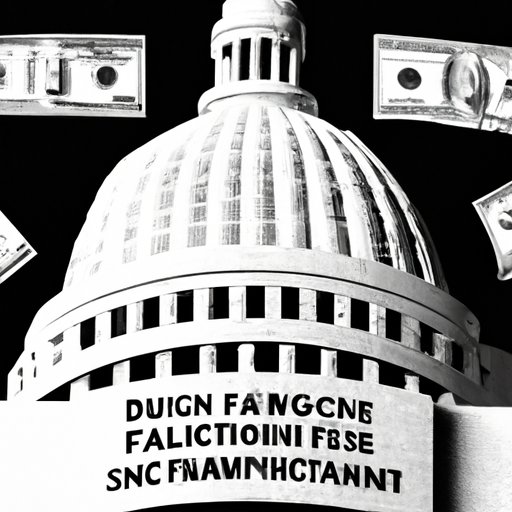Introduction
Campaign finance reform is a process that seeks to change the current system of financing political campaigns. It involves changing the rules governing how candidates and their supporters can raise and spend money for political purposes. The goal of this reform is to increase transparency and reduce the influence of money in politics.

Overview of Why Campaign Finance Reform Matters
The way in which money is raised and spent in political campaigns has a significant effect on the outcome of elections. Money can be used to influence the outcome of elections by buying advertisements and funding attack ads. Money can also be used to buy votes by providing monetary incentives to voters. These practices are often seen as unfair and have the potential to undermine democracy.
In addition, the current system of campaign finance is highly unequal. Wealthy individuals and organizations are able to donate large amounts of money to support their preferred candidates. This can give them an unfair advantage over other candidates who do not have access to such resources. This inequality has the potential to distort the outcome of elections and contribute to political polarization.
For these reasons, many people believe that the current system of campaign finance needs to be reformed. Such reforms could help to create a more equitable and transparent system for financing political campaigns.
Impact of Campaign Finance Reform on Political Campaigns
Campaign finance reform can have both positive and negative effects on political campaigns. On the one hand, it can make it easier for candidates to raise money from a wider range of sources and reduce the amount of money needed to run a successful campaign. On the other hand, it can also create costly regulations and compliance requirements for candidates and donors, making it harder for some to participate in the political process.
Impact on Candidates and Donors
Campaign finance reform can have a major impact on candidates and donors. According to a study by the Center for Responsive Politics, “The most direct impact of campaign finance reform is on the ability of candidates to raise money and the willingness of donors to give.”
For example, contribution limits can restrict the amount of money that individuals and organizations can donate to a particular candidate. This can make it harder for certain candidates to raise enough money to run a competitive campaign. Similarly, disclosure requirements can make it harder for donors to remain anonymous, which can discourage them from contributing to political campaigns.
Impact on Election Outcomes
Campaign finance reform can also have an impact on election outcomes. According to a study by the Brennan Center for Justice, “Reforms that equalize the playing field between wealthy and non-wealthy candidates can lead to better representation in office, with representatives that reflect the interests and values of the general population rather than just those of the donor class.”
For example, public financing programs can provide additional resources to candidates who may otherwise be unable to compete against well-funded opponents. This can help to level the playing field and make it easier for less-well-funded candidates to win elections. Similarly, contribution limits can reduce the influence of money in politics, which can lead to more competitive elections and a more representative government.

Pros and Cons of Campaign Finance Reform
Campaign finance reform can have both positive and negative effects on our political system. Here are some of the pros and cons of implementing such reforms:
Pros
1. Increased Transparency: Campaign finance reform can increase transparency by requiring candidates and donors to disclose information about their finances. This can make it easier for voters to see where candidates are getting their money and how they are spending it.
2. Reduced Influence of Money in Politics: Campaign finance reform can reduce the influence of money in politics by limiting the amount of money that individuals and organizations can donate to political campaigns. This can help to create a more level playing field and reduce the potential for corruption.
3. Improved Voter Participation: Campaign finance reform can also make it easier for voters to participate in the political process by making it easier for them to access information about candidates and their policies. This can help to increase voter turnout and make elections more competitive.
Cons
1. Costly Regulations and Compliance Requirements: Campaign finance reforms can often be expensive to implement and require extensive regulations and compliance requirements. This can make it difficult for some candidates and donors to participate in the political process.
2. Complexity of Reforms: Campaign finance reform can also be complex and difficult to understand. This can make it challenging for candidates and donors to comply with the rules and can lead to confusion and frustration.
3. Potential Unintended Consequences: Finally, campaign finance reform can have unintended consequences. For example, contribution limits can limit the amount of money that candidates and their supporters can raise, which can make it harder for some candidates to compete in elections.
Different Types of Campaign Finance Reform
There are several different types of campaign finance reform that can be implemented. These include:
Contribution Limits
Contribution limits restrict the amount of money that individuals and organizations can donate to political campaigns. This can help to reduce the influence of money in politics and create a more level playing field for candidates.
Disclosure Requirements
Disclosure requirements require candidates and their supporters to disclose information about their finances. This can make it easier for voters to see where candidates are getting their money and how they are spending it.
Public Financing
Public financing programs provide candidates with additional resources to run their campaigns. This can help to level the playing field between wealthy and non-wealthy candidates and reduce the influence of money in politics.
Electioneering Restrictions
Electioneering restrictions limit the amount of money that can be spent on certain activities, such as advertising and attack ads. This can help to reduce the influence of money in politics and create a more level playing field for candidates.

How Campaign Finance Reform Could Change Our Political System
If implemented correctly, campaign finance reform can have a number of positive impacts on our political system. Here are some of the ways that it could change the way we vote:
More Competitive Elections
Campaign finance reform can make elections more competitive by reducing the influence of money in politics. This can help to create a more level playing field between wealthy and non-wealthy candidates and make it easier for less-well-funded candidates to win elections.
Greater Accountability
Campaign finance reform can also make politicians more accountable to their constituents. Disclosure requirements can make it easier for voters to see where candidates are getting their money and how they are spending it. This can make it easier for voters to hold politicians accountable for their actions.
Increased Diversity
Finally, campaign finance reform can help to increase diversity in our political system. Public financing programs can provide additional resources to candidates who are traditionally underrepresented, such as women and people of color. This can help to create a more inclusive and representative government.
Conclusion
Campaign finance reform can have a major impact on our political system. It can reduce the influence of money in politics, create a more level playing field for candidates, and increase accountability and diversity in our government. Although there are some drawbacks to campaign finance reform, such as costly regulations and potential unintended consequences, the potential benefits far outweigh the risks.
Overall, campaign finance reform is an important step towards creating a more equitable and transparent system for financing political campaigns. By implementing such reforms, we can ensure that our elections are fair and our government is more responsive to the needs of its citizens.
(Note: Is this article not meeting your expectations? Do you have knowledge or insights to share? Unlock new opportunities and expand your reach by joining our authors team. Click Registration to join us and share your expertise with our readers.)
